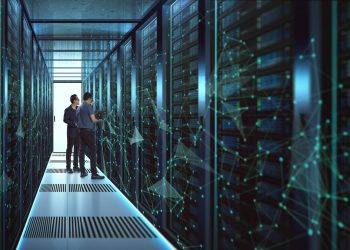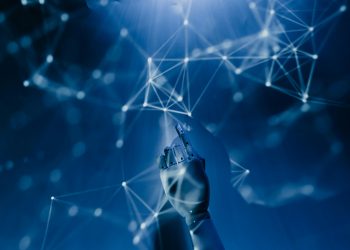In today’s rapidly evolving technological landscape, the integration of blockchain and artificial intelligence (AI) has become a topic of great interest and significance. Blockchain, the decentralized and immutable ledger technology, and AI, the domain of intelligent machines and algorithms, are two powerful forces that have the potential to revolutionize various industries. This article delves into the synergy between blockchain and AI, highlighting the manifold opportunities and implications it presents for businesses and society. Trade smarter using the modern day online trading platform named Matrixator. Visit the official website now https://matrixator.io/ to get started!
Understanding Blockchain and AI
What is Blockchain?
Blockchain technology, often associated with cryptocurrencies like Bitcoin, is a distributed ledger that maintains a continuously growing list of records called blocks. These blocks are cryptographically linked to form a chain, ensuring immutability and transparency. Unlike traditional centralized systems, blockchain operates in a decentralized manner, eliminating the need for intermediaries and enhancing trust among participants.
What is AI?
Artificial Intelligence, on the other hand, refers to the simulation of human intelligence in machines that are programmed to perform tasks requiring human-like cognition. AI encompasses various subfields, including machine learning, natural language processing, computer vision, and robotics. By leveraging data and algorithms, AI systems can analyze vast amounts of information, detect patterns, make predictions, and automate complex processes.
The Convergence of Blockchain and AI
The intersection of blockchain and AI brings forth a host of synergies that can unlock tremendous value and innovation. Let’s explore some key areas where this convergence is making a significant impact:
Data Privacy and Security
Blockchain’s inherent properties, such as decentralization and immutability, provide an ideal foundation for enhancing data privacy and security in AI applications. By storing data on a distributed ledger, blockchain eliminates single points of failure and reduces the risk of data breaches. Additionally, smart contracts, self-executing agreements on the blockchain, can ensure data confidentiality and permissioned access, giving individuals greater control over their personal information.
Trusted Data Sharing and Collaboration
In the realm of AI, access to high-quality and diverse datasets is crucial for training robust machine learning models. However, data silos and concerns around data privacy often hinder efficient collaboration among organizations. Blockchain-powered solutions enable secure data sharing, where participants can maintain control over their data while selectively granting access to trusted parties. This encourages data collaboration and fosters the development of more accurate and comprehensive AI models.
Transparent and Ethical AI
The transparency and auditability of blockchain can address the ethical concerns associated with AI algorithms. As AI systems make critical decisions that impact individuals and society, it becomes imperative to understand the reasoning behind those decisions. By integrating blockchain, the decision-making process can be recorded on an immutable ledger, enabling accountability, fairness, and explainability. This helps build trust in AI systems and ensures adherence to ethical standards.
Decentralized AI Marketplaces
Blockchain’s decentralized nature can disrupt the traditional AI marketplaces by removing intermediaries and promoting peer-to-peer interactions. Smart contracts enable direct transactions between AI developers and users, eliminating the need for intermediaries and reducing costs. This decentralized marketplace fosters innovation, allowing AI developers to monetize their models and users to access AI services more efficiently.
Real-World Applications
The synergy between blockchain and AI is already yielding impactful applications across diverse industries. Here are some notable examples:
Supply Chain Management
Blockchain and AI integration can revolutionize supply chain management by enhancing traceability, transparency, and efficiency. AI-powered analytics can analyze data from various supply chain stages, enabling real-time tracking, quality control, and predictive maintenance. Blockchain ensures the integrity and immutability of supply chain data, providing a trustworthy audit trail for stakeholders.
Healthcare
In the healthcare industry, blockchain and AI collaboration can address challenges related to patient data privacy, interoperability, and medical research. Blockchain secures patient records and enables seamless data exchange between healthcare providers while maintaining privacy rights. AI algorithms can leverage this shared data to derive valuable insights, improve diagnostics, and develop personalized treatment plans.
Financial Services
Blockchain and AI integration can enhance the efficiency, security, and accessibility of financial services. Smart contracts on the blockchain facilitate automated and transparent transactions, reducing the need for intermediaries. AI algorithms can analyze financial data in real-time, identify patterns, detect fraud, and provide personalized financial recommendations to users.
Energy and Sustainability
The combination of blockchain and AI has the potential to revolutionize the energy sector by enabling peer-to-peer energy trading, grid optimization, and renewable energy management. Blockchain-based platforms allow individuals and organizations to trade excess energy directly, promoting decentralization and sustainability. AI algorithms can optimize energy consumption, predict demand patterns, and optimize renewable energy generation.
Challenges and Future Outlook
While the synergy between blockchain and AI presents immense potential, several challenges need to be addressed for widespread adoption. These include scalability issues, regulatory frameworks, interoperability standards, and ethical considerations. As technology evolves and stakeholders collaborate, these challenges are expected to be mitigated, paving the way for a future where blockchain-powered AI solutions are seamlessly integrated into various domains.
Conclusion
In conclusion, the convergence of blockchain and AI holds transformative potential, enabling enhanced data privacy, trusted collaboration, transparent decision-making, and decentralized marketplaces. The synergy between these technologies is driving innovation across industries such as supply chain management, healthcare, finance, and energy. However, realizing the full benefits requires addressing technical, regulatory, and ethical challenges. As businesses and society embrace this synergy, we can expect a future where blockchain-powered AI reshapes the way we live, work, and interact.
















